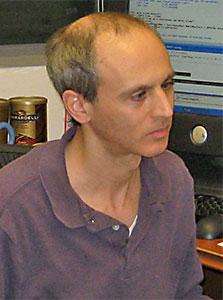
David H. Epstein, Ph.D.
Senior Investigator
Translational Addiction Medicine Branch, Real-world Assessment, Prediction, and Treatment Unit
NIDA
Research Topics
The RAPT Unit was established by Dr. Epstein in 2017 to bring the IRP’s treatment research into the age of predictive analytics and personalized medicine. Implicit in the name—“Real-world Assessment, Prediction, and Treatment”—is our intent to show that when addiction research moves forward, so do prevention and treatment. So our watchword, even if it sounds like a buzzword, is actionable:
- We derive actionable information from our use of smartphones, GPS, and biosensors in everyday assessment of people’s moods, exposure to built and social environments, and drug use. That information can help us deliver mobile treatments, electronically, when and where they’re needed.
- We formulate actionable ideas from neuroscience and laboratory-based behavioral sciences, collaborating closely with colleagues at the IRP and worldwide to translate their discoveries into treatments.
Selected Publications
- Smith KE, Epstein DH, Weiss ST. Controversies in Assessment, Diagnosis, and Treatment of Kratom Use Disorder. Curr Psychiatry Rep. 2024;26(9):487-496.
- Smith KE, Panlilio LV, Feldman JD, Grundmann O, Dunn KE, McCurdy CR, Garcia-Romeu A, Epstein DH. Ecological Momentary Assessment of Self-Reported Kratom Use, Effects, and Motivations Among US Adults. JAMA Netw Open. 2024;7(1):e2353401.
- Rogers JM, Weiss ST, Epstein DH, Grundmann O, Hill K, Smith KE. Kratom addiction per DSM-5 SUD criteria, and kratom physical dependence: Insights from dosing amount versus frequency. Drug Alcohol Depend. 2024;260:111329.
- Hill K, Rogers JM, Grundmann O, Epstein DH, Smith KE. At least four groups of kratom consumers in the United States: latent-class analysis of motivations for kratom use. Am J Drug Alcohol Abuse. 2025;51(2):191-203.
- Smith KE, Panlilio LV, Sharma A, McCurdy CR, Feldman JD, Mukhopadhyay S, Kanumuri SRR, Kuntz MA, Hill K, Epstein DH. Time course of kratom effects via ecological momentary assessment, by product type, dose amount, and assayed alkaloid content. Drug Alcohol Depend. 2024;264:112460.
Related Scientific Focus Areas


Social and Behavioral Sciences
View additional Principal Investigators in Social and Behavioral Sciences


This page was last updated on Friday, August 29, 2025